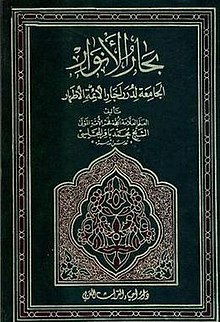Bihar al-Anwar (Arabic: بِحَار ٱلْأَنْوَار, romanized: Biḥār al-Anwār, lit. 'Seas of Lights') is a comprehensive collection of hadith compiled by Shia scholar Muhammad Baqir Majlisi (d. 1110/1698). It is a hadith collection as the secondary source used beside the Four Books.
 | |
| Author | Mohammad-Baqer Majlesi |
|---|---|
| Language | Arabic |
Title edit
The full name of the book, Biḥār al-ʾAnwār al-Jāmiʿah li-Durar ʾAkhbār al-ʾAʾimmah al-Aṭhār (Arabic: بِحَار ٱلْأَنْوَار ٱلْجَامِعَة لِدُرَر أَخْبَار ٱلَأَئِمَّة ٱلْأَطْهَار) (lit. Seas of Lights: The Collection for Pearls of Traditions of the Pure Imams) illustrates that Majlisi did not collect anything he had access to in the book.[1][2]
Author edit
Mohammad-Baqer Majlesi was born in 1617 in Isfahan. He was a student of Mulla Sadra. He has been described as the most powerful and influential Shia Ulems. On 1687, he was appointed as Sheikh ul-Islam by Sultan Husayn in Isfahan, the capital city of the Persian Empire.[3] He developed Twelver doctrine by investigating Shia and Sunni hadith. Over 100 books in Arabic and Persian were authored by him.[4][5]
Prelude edit
Majlisi compiled it to gather all the ahadith he could access. His primary goal was to preserve the available knowledge for future generations.[5] Majlisi has acknowledged this issue in the preface of Bihar al-Anwar, emphasizing that the traditions collected were not included without being subjected to scrutiny, a task in itself that was a major undertaking. Majlisi says, "Then I chose to examine the traditions of the infallible, righteous Imams, started exploring them and investigated them as was their right and I acquired its skill as was its due." Despite Majlisi acknowledgment, criticism has remained about his approach with some critics suggesting that he has gathered both "pearls" and "pebbles".This book includes all the narrations that receive to Shia. Writing Bihar lasted about 36 years. To write this book, Majlisi got help from other scholars and his students.
Context edit
Bihar al-Anwar as the most comprehensive hadith collections includes narrations of Shias (Twelver), based on Shia sources. The collection also contains his commentary on these narrations.[2][1] He used about 400 sources which were written by Sunni and Shia scholars such as, Shaykh al-Saduq, Shaykh Tusi, Al-Shaykh Al-Mufid, Sharif al-Murtaza, Muhammad Jamaluddin al-Makki al-Amili, Sayyed Ibn Tawus, Al-Hilli, Zayn al-Din al-Juba'i al'Amili.[6] The author wrote this book in 25 volumes, but, a new version is published in 110 volumes by some changes and contains more than 100,000 ahadith from Muslim sources.
Editions edit
- Majlisī, Muḥammad Bāqir al-, Biḥār al-nwār al-Jāmiʿahli-Durar Akhbār al-Aʾimmat al-Aṭhār [The Oceans of Lights: A Compendium of the Pearls of the Narrations of the Pure Imāms], 110 vols (Beirut: Muʾassasat al-Wafāʾ, 1983).
Commentaries edit
- Mashra'a bihar al-anwar by Muhammad Asif Mohseni
See also edit
References edit
- ^ a b Kohlberg, Etan. "BEḤĀR AL-ANWĀR".
- ^ a b Ansari, Nasiruddin. "Bihar al-anwar (Oceans of Lights) is".
- ^ Debating Muslims: Cultural Dialogues in Postmodernity and Tradition. University of Wisconsin Press; 1 edition (February 17, 2002). 1990. p. 471. ISBN 978-0299124342.
Mu 'jam al-mufahras li-alfaz ahadith Bihar al-anwar.
- ^ MATSUNAGA, Yasuyuki. "EXAMINING THE VIEWS OF 'ALLAMAH MAJLISI ON LEGITIMATE POLITICAL AUTHORITY (SULTANAT-I MASHRU'AH) AND THE GUARDIANSHIP OF THE JURIST (WILAYAT-I FAQIH)".
- ^ a b Youngman Skreslet, Skreslet, Paula, Rebecca (2006). The Literature of Islam: A Guide to the Primary Sources in English Translation. Scarecrow Press (September 20, 2006). ISBN 978-0810854086.
{{cite book}}: CS1 maint: multiple names: authors list (link) - ^ Muntazir Qa'im, Mahdi. "Sources".
External links edit
- Bihar al-Anwar Volumes 1 – 74 English Translation, compiled by Allamah Majlesi, translated by Hub-e-Ali organization, publicly available for free.
- Bihar Al-Anwar, Kitab al-Ghaybah (Vols. 51, 52 & 53) – The Promised Mahdi, English Translation Part 1 and Part 2, compiled by Allamah Majlesi, translated by Athar Husayn S.H. Rizvi, publicly available for free.